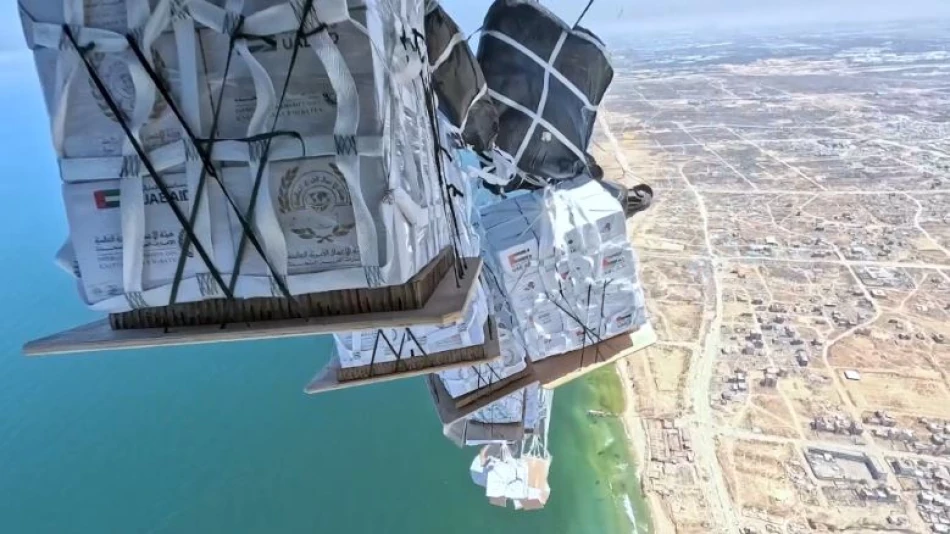
UAE Conducts 71st Aerial Humanitarian Aid Drop in Gaza Strip
UAE Delivers 71st Gaza Airdrop as Regional Humanitarian Coalition Expands
The United Arab Emirates has completed its 71st airdrop of humanitarian aid to Gaza, marking a significant milestone in what has become one of the most sustained international relief efforts in the region. The operation, conducted through a growing coalition of European and Arab nations, underscores how Middle Eastern states are increasingly taking leadership roles in crisis response while building strategic partnerships beyond traditional alliances.
Multi-National Coalition Takes Shape
The latest airdrop, part of the UAE's "Birds of Goodness" initiative under the broader "Noble Knight 3" operation, was executed in partnership with Jordan and included participation from Germany, Italy, Belgium, and France. This European involvement signals a diplomatic shift where Gulf states are successfully mobilizing Western support for regional humanitarian efforts.
The operation delivered essential food supplies prepared with support from Emirati charitable organizations, bringing the total UAE airdrops to over 3,956 tons of varied aid including food and critical supplies.
Strategic Implications Beyond Humanitarian Relief
Regional Leadership Dynamics
The UAE's sustained commitment reflects a broader trend of Gulf states positioning themselves as indispensable humanitarian actors. Unlike traditional donor countries that often work through UN agencies, the UAE has created its own operational framework, allowing for more direct control over aid distribution and diplomatic messaging.
This approach mirrors successful humanitarian diplomacy models used by countries like Turkey and Qatar in previous regional crises, where aid delivery becomes a tool for broader geopolitical influence and relationship-building.
Coalition Building Success
The participation of multiple European nations alongside Arab partners represents a diplomatic achievement for the UAE. By creating an operational framework that allows Western countries to contribute without leading, the Emirates has solved a common problem in Middle Eastern crisis response where competing political positions often paralyze multilateral efforts.
This model could prove replicable for future regional crises, establishing the UAE as a preferred partner for countries seeking to provide humanitarian assistance while navigating complex political sensitivities.
Economic and Political Calculations
For the UAE, sustained humanitarian leadership serves multiple strategic objectives. The operations reinforce the country's position as a responsible regional power while building goodwill across the Arab world. The involvement of European partners also strengthens the UAE's position as a bridge between Western interests and regional realities.
The scale of the operation—71 airdrops totaling nearly 4,000 tons—represents a substantial financial commitment that signals long-term strategic thinking rather than short-term crisis response. This level of sustained engagement typically indicates broader policy objectives beyond immediate humanitarian concerns.
Broader Regional Implications
The UAE's humanitarian leadership in Gaza occurs against the backdrop of ongoing regional realignment, where traditional power structures are evolving. By successfully mobilizing both Arab and European partners, the Emirates demonstrates how middle powers can create effective coalitions for specific objectives.
This approach may influence how other regional crises are addressed, potentially creating new models for international cooperation that bypass traditional UN-led frameworks while maintaining legitimacy through broad participation.
Most Viewed News

 Sara Khaled
Sara Khaled






